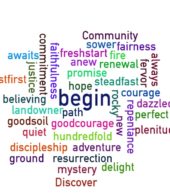Easter is a Season (Not a Day)
A Strange Easter
The First Sunday of Easter was strange this year. Like many people, I sat in front of a computer screen to participate in communal worship. Trying to celebrate the Resurrection without physically gathering in community just didn’t feel like Easter. Many friends and acquaintances said that they felt like they missed Easter this year, too. Without our usual rituals and ways of worshipping, it almost seemed like we somehow skipped past the holiday.
Not only did Easter itself feel strange, it felt nearly sacrilegious to celebrate resurrection while so much dying is still happening all around us. The daily news reports surging numbers of COVID-19 diagnoses and deaths. So many people are dying. They are dying all around the world and they are dying close to home.
Although the pandemic dominates our attention, death continues in “ordinary” ways as well. Both my mother-in-law and my step-brother died in the last month. We have not yet gathered with loved ones to grieve nor have we been able to gather for a funeral ritual to honor their lives together. Like Easter, their passing seems surreal. My grief feels suspended, like the grief itself lives in quarantine.
Loss Comes in Many Forms
Death and loss come in many forms. Some people are experiencing a death of roles and responsibilities as they face a slowing down, a cooping up, a forced sabbath. Others are experiencing the death of their sense of safety as they work without enough protective measures or as they work overtime with very little rest. Some, especially elders, have lost forms of connection, leaving them lonely and scared. The most vulnerable among us are having difficulty putting food on the table or worried about how to pay for healthcare. Those living in crowded quarters, those who are incarcerated, and those experiencing violence or tension at home were already vulnerable. Now they have lost even the slightest margin of security.
Even in the best-case scenario, we are frustrated and off-kilter. To one degree or another, we are all experiencing “death” in some aspects of our lives. Our relationships are strained. Our work life is different. Most of us are worried about our jobs; many of us have lost our jobs already. Our plans, ceremonies, and “nonessential" healthcare are delayed or cancelled. We fear for what our country is becoming.
Culturally, we are experiencing the death of a way of life. Some days, it seems almost impossible to engage a spirit of Resurrection when we are surrounded by so much loss. In many ways, Easter feels like the wrong holiday at the wrong time. How do we celebrate Easter when we are still grieving, still repenting, still needing forgiveness, still mourning? Many of us are still slogging through Lent emotionally.
While it feels more pronounced this year, this is not unfamiliar dynamic for me. I often find myself personally or emotionally in a different space than particular holy days are trying to engage. I experienced this most profoundly for the six Advent seasons during the six years I struggled with infertility. As someone who longed to become a parent, the pregnancy and birth metaphors were difficult (and even painful) to engage. Although Christmas came each of those years, I was somehow stuck in an emotional Advent. During those years of infertility, I felt like I never really moved out of the season of waiting. Even so, there was something important about the practice of reaching Christmas. God wanted to be born into the world in a new way, whether I was prepared for it or not. Different holidays invite us into different aspects of what it means to be human—even if we are not quite ready for a specific sentiment when it arrives on the calendar. That brings us back to Easter 2020 and its invitations.
Invitations of Easter 2020
This Easter Season is inviting us to remember that resurrection takes time; it doesn’t happen immediately. After all, Jesus did not rise immediately after his death. It took a few days. Culturally, most American Christians miss the power of this lesson. When we celebrate Easter as only one single day, we are attempting to cram all the power of resurrection into too short a span of time. Easter is a season of 50 days because resurrection is complex; it takes a while to live into and to comprehend. One day does not teach us all we need to know.
Easter 2020 has another invitation for us—that resurrection comes whether we are ready or not. We do not have to be experiencing a particular emotional state in order to witness new life emerging. Judging from the experience of the first disciples, resurrection comes even while we are still grieving, while we are unprepared, while our emotional states are all over the place.
Resurrection is a Verb (not only a noun)
The reason why it is so easy to miss these invitations is that we usually think of resurrection as a noun, as an event pertaining only to Jesus. I have found it helpful to think of resurrection as a verb: a process, an energy, a perpetual push toward new life. God is a God of Resurrection—a God who never accepts death of any kind as the last word. Jesus’ Resurrection was God’s strongest statement of this truth, but God’s resurrecting energy lives on eternally. This Easter season, once again, I am trying to hold the ambiguity, uncertainty, and discomfort of experiencing resurrection as a verb. I am processing the grief of losing loved ones during this time, the grief of witnessing others lose so much, and I am experiencing anticipatory grief for much that is yet to come. At the same time, I am striving to be a witness to a Resurrection process that I do not fully understand and am having a hard time feeling right now.
But, Resurrection is stubborn and steadfast. It comes again and again wherever there is death. Resurrection comes while we are still grieving, while physical distancing guidelines are still in effect. Resurrection comes whether we are personally or communally ready for it. And I am grateful it works that way—completely out of our control. I am grateful for holidays and seasons that invite me to stretch beyond my personal experience into our shared human experience. The long and complex Easter season offers this assurance: New life is breaking forth during every moment—whether we are ready to receive it or not. New life is breaking forth whether we even recognize it or not. That great and persistent mystery takes time to absorb. The good news: Easter season is not yet over. We still have the rest of this Easter season to practice . . . and every Easter season yet to come.

Kiely Todd Roska will co-facilitate an online event on June 24 with Eily Marlow called Living with Complexity. Learn more and register here.
Learn more about core Benedictine values.






